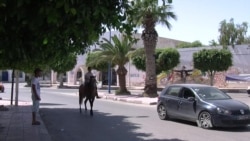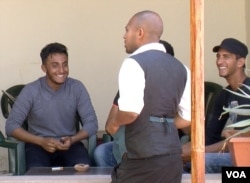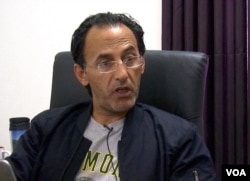Shortly after Tunisia’s 2011 revolution, 25-year-old Issam Nouaili set sail for Europe from this southern port town, taking advantage of lax border controls in the ensuing chaos. But the good life he hoped for did not lie on the other side of the Mediterranean.
Instead, he found himself working in the gritty underbelly of Paris, first demolishing buildings and then flipping pizzas, paid under the table as an illegal migrant.
“I was disgusted with life in France,” he said. “It was very hard to find work without papers.”
Three years later, Nouaili went home. Unlike many young Tunisians, he now has a job. After enrolling in business training, he opened up his own auto parts business seven months ago.
“The training was really good,” said Nouaili, showing off his stock of tires and bolts. “It changed my life.”
Both the training and startup funds for his business were bankrolled by the French government, amid a broader European effort to find solutions to the migrant crisis that has brought nearly 215,000 asylum seekers to its shores this year.
Their plight came into renewed focus on Thursday, as Medecins Sans Frontieres tweeted it had rescued more than 1,100 people at sea.
Lack of opportunity
While roughly 10 percent of Tunisians live abroad, this tiny North African country is hardly Europe’s biggest headache. The post-revolutionary uptick in illegal migration — with up to 25,000 Tunisians heading to Europe in the first months of 2011 — has since slowed to a trickle. One reason: tougher border controls and cooperation agreements with the European Union and individual member states.
Earlier this year, the EU also struck a deal with Turkey to curb the numbers of migrants arriving on its shores, mostly from war-torn Syria and Iraq, along with sub-Saharan Africa.
Yet Tunisia may offer a telling tale of what comes next. For those returning here, or those who never left, the prospects are bleak. Five years after the country’s uprising — partly fueled by the self-immolation of an unemployed man — rising insecurity has driven away tourists and foreign investment.
In the poorest regions — including the southern Medinine governorate where Zarzis is located — about one-third of young Tunisians are jobless, rising to nearly two-thirds among college graduates. Earlier this year, protests over jobs and lack of economic opportunities spread across the country.
Training help
The training program for returnees — part of a broader migration deal between France and Tunisia — offers a bright spot of hope.
In Zarzis ADDCI, the NGO overseeing the program in the southern part of the country, says 90 percent of the start-up businesses are still running.
“We tell the trainees that if they don’t make their project a success, they penalize others who want the same help,” says ADDCI’s President Faycal Dchicha.
Yet Dchicha is the first to admit the project is no solution to Tunisia’s broader problems. Fewer than 500 people have graduated from the course to date.
“I think you need to do a great project of development that offers more chance for young people here,” says Dchicha, who describes opportunities developing the solar energy sector and organic farming for European markets.
Analyst Susan Fratzke of the Migration Policy Institute, a Washington-based nonprofit, agrees that broader development responses are needed if migration's root causes are to be addressed.
But this may be no time to find them — at least not in Europe.
“Right now, the European public wants immediate results,” Fratzke says. “When you’re looking at large-scale infrastructure and development projects, the results are anything but short term.”








